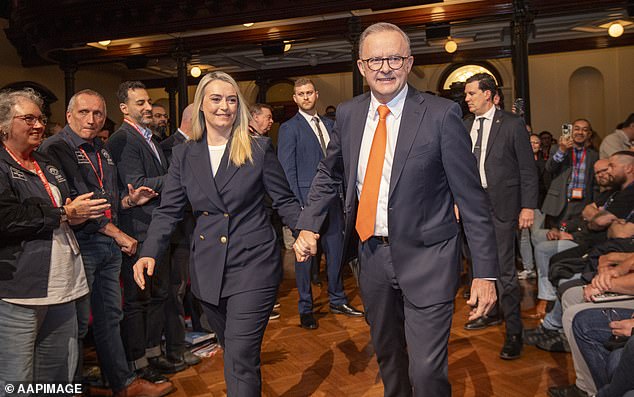Voters have voiced their biggest concerns about the cost of living amid support for Anthony Albanese and the Labor government falling to its lowest level since the 2022 election.
The latest Newspoll survey for the The Australian revealed that housing, including rent and interest rates, was by far the biggest concern of Australian voters.
With the federal election approaching, the result is likely to be bad news for Albanese, as his 2022 election promise to build thousands of affordable homes has only just taken its first step.
Less than a fortnight ago, the Labor government finally gave the green light to the construction of 13,700 social and affordable homes in the first round of grants under its Housing Australia Future Fund.
The fund was part of Mr Albanese’s pledge to help first-time homeowners access the property market and aimed to build 40,000 in five years.
With 40 per cent of voters viewing housing policies as a deciding factor in next year’s federal election and Labor’s seemingly slow pace, support for the party has hit its lowest levels since the 2022 election.
Newspoll data showed Labour’s primary support had fallen to just 31 per cent for the first time since the failed Voice referendum last year.
The Coalition’s primary vote remained stable at 38 percent.
Voters have cited housing as their top cost-of-living concern amid falling support for Anthony Albanese’s Labour Party (pictured, Albanese with partner Jodie Haydon)

With 40 per cent of voters selecting housing policies as a deciding factor for next year’s federal election and Labor’s seemingly slow pace, support for the party has hit its lowest levels since the 2022 election.
Of all voters surveyed by Newspoll, 40 percent were most concerned about housing costs, 25 percent about food costs, 18 percent about energy bills and 11 percent about insurance.
Transportation costs, including fuel, were considered the least important issue.
The only demographic that did not rank housing as the most pressing issue was those over 65. Instead, they were more concerned about energy and food prices.
Among those aged 18 to 34, 59 percent considered housing to be the most important issue and 27 percent said food.
Housing was also the most pressing concern for 52 percent of 35- to 49-year-olds and 32 percent of 50- to 64-year-olds.
Support for the two main parties – Labor and the Coalition – was split 50/50, but support for the two leaders fell once the poll was opened to smaller parties and independents.
The Greens won 13 percent of voter support, independents 12 percent and Pauline Hanson’s One Nation party six percent.
Despite the drop in support for Labor, Albanese’s satisfaction rating improved two points to 43 percent, while his dissatisfaction rating fell three points to 51 percent, giving him a net satisfaction rating of -8 percent.

Liberal leader Peter Dutton (pictured) saw his satisfaction drop two points to 37 per cent, but his dissatisfaction rating remained unchanged at 52 per cent, giving him a net satisfaction of -15 per cent.

Forty percent of voters surveyed were most concerned about housing
Liberal leader Peter Dutton saw his satisfaction drop two points to 37 per cent, but his dissatisfaction rating remained unchanged at 52 per cent, giving him a net satisfaction of -15 per cent.
The rating was Dutton’s worst since June.
When asked who would make a better prime minister between Albanese and Dutton, 46 per cent said Albanese and 37 per cent said Dutton.


